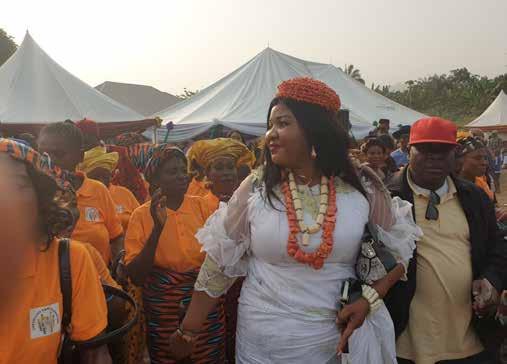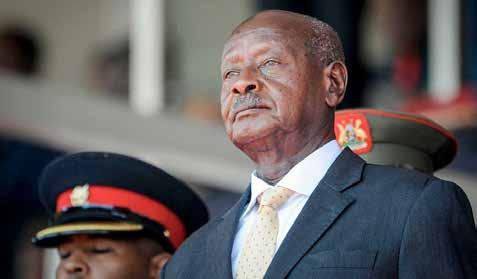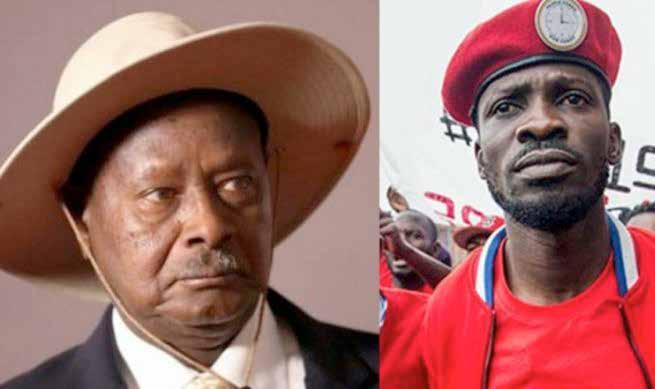
10 minute read
Two major Airlines drop mask requirement for First
from The Voice magazine
Two major Airlines drop mask requirement for First & Business Class
Cathay Pacific has joined Qatar Airways in a rare category, at least for now. The two airlines allow passengers in their flatbed business or first class seats to lay down for a good night’s sleep without having to wear a face mask. Yes, whereas everyone else on the plane must keep their mask on for the duration of the flight, passengers upfront have been granted a golden new loophole, and one with plenty of controversy. Is it a sign of old times slowly returning amid positive vaccination and mitigation news, or a risky gamble, perhaps too soon to determine or for financial gain? Cathay Pacific now allows first and business class passengers on flights equipped with a flatbed to remove their mask when the seat is fully reclined into a flatbed mode, aka the sleeping position. Passengers are expected to keep masks on in other settings. The new directive was unearthed by Executive Traveller via an internal memo to staff, which has since been confirmed. Qatar Airways was the first, and for a while, the only airline to allow passengers in its business class cabin, or beloved Qsuites, to use masks “at their discretion” rather than as standard policy. Qatar Airways provides privacy doors in most business class seats, transforming seats into ‘suites’. Qatar Airways now says masks are mandatory for all, despite words to the contrary, and a press release stating ” Business Class customers are asked to wear their face shield and mask on board at their own discretion, as they enjoy more space and privacy.” The new Cathay Pacific change is in response to ongoing studies which suggest that in this flat position, high walls between passengers combined with state of the art HEPA filters and greater levels of distancing in business and first class don’t pose additional risk, even without masks worn at all times. This has been backed up by recent US Department of Defense
Advertisement
studies which examined the extent of particle spread and filtration in real planes, on actual flights across a wide variety of variables, and pointed to the success of HEPA systems Masks must still be worn when upright on Cathay Pacific, even in first or business class, and there’s no exception for anyone sleeping across a row of seats in economy or premium. Qatar is more lenient with business class discretion. In addition to a face mask, Qatar Airways also makes all economy passengers wear a face shield, creating quite a gulf between rules for cozy passengers up front, and those down the back. Will Other Airlines Join? It’s intriguing that Hong Kong based Cathay Pacific is the second airline to join in reducing mask mandates. Hong Kong has been one of the strictest cities in fighting off covid-19, and even flight crews face huge restrictions when entering. Travel corridors with Singapore were put on hold over 60 cases, bursting plans for regional travel. If the airline feels comfortable with the policy, perhaps others will too. Cathay Pacific also makes the second Oneworld airline to offer such an exception. All other exemptions from other airlines center around validated medical reasons, rather than choice. Could a British Airways, or American Airlines follow next? Or will we see airlines from other alliances begin to ease mask requirements on board? It’s a brave new time ahead for airlines, that’s for sure.




Chief Mrs. Evelyn Azih (Ugoeze Ndigbo 1)





Chief Lady Evelyn Azih (Ugoeze Ndigbo 1) With heart filled with joy, we wish to express our gratitude and appreciation to friends and well wishers who made out time to be with us during the recognition of our daughter, Chief Lady Evelyn Azih (Ugoeze Ndigbo 1) by His Royal Highness Igwe Ituma, the Onyima II of Ekpulato Mgbowo Autonomous Community in Enugu State of Nigeria. The event took place on Monday 28th December, 2020. She equally appreciate those who supported her in one way or the other before, during and after the event. She prays for God’s blessings and protection over each and everyone And she wishes all the very best of the year 2021. Signed: Chief Mrs. Evelyn Azih. (Ugoeze Ndigbo 1)













Defeating Museveni can’t be achieved through international pressure alone

In the past few months, Western media and academia have placed unprecedented, and somewhat bewildering, focus on Uganda’s 2021 general elections. It is puzzling because throughout the 2000s and 2010s, most Western commentators either painted a positive image or took a largely lukewarm interest in the deepening tenor of Yoweri Museveni’s 35-year-long authoritarian rule. The fact is Museveni’s military dictatorship has been draped in civilian garb for a long time. As a routine ritual, Museveni purports to seek legitimation every five years through elections. These elections are scarcely free, fair or credible. This has been particularly true since at least 2001 when Museveni first faced a serious challenge to his stay at the helm. At a personal, idiosyncratic level Museveni loathes political competition. He has expressed indignation for electoral rules that should apply to all actors. Because he holds an exaggerated sense of messianic mission for Uganda and Africa, he feels irritated having to subject himself to the
President Museveni has been put under pressure to perform in this new six years tenure he has grabbed through a questionable election held in February 2021.
motions of electioneering. As Museveni’s rule has become more repressive, public opinion and media coverage in the West have shifted dramatically against him. In the 2021 elections, many in the community of pro-democracy advocates and activists in Africa found reason to overtly and pro actively support Museveni’s main challenger for the presidency, the pop star and member of parliament Robert Kyagulanyi, more popularly known as Bobi Wine. Expertise is crucial. It’s why our articles are written by academics
About us
However, the obsession with Bobi Wine is problematic. This is because it fails to grasp the complex conditions around Museveni’s stay in power and the daunting dilemma of freeing the country from his firm grip. Museveni is a ruler whose primary source of power is the bullet – not the ballot. Resisting and defeating such an entrenched authoritarian ruler cannot be achieved through pressure from Western powers alone. The forces and fuel that can prudently take down Museveni – in a way that advances the cause of genuine democracy and freedom – must necessarily evolve and emerge from Uganda and among Ugandans. It is my argument that the outsized role of external agitators might in fact hurt rather than help the struggle for liberation from what is now a decayed, moribund and personalised system of rule. It’s not enough to chase out Museveni

The Western media made the recent election about Bobi Wine as a person rather than what is critically at stake for Uganda and Ugandans. This meant that they handed Museveni a free pass to smear and discredit his opponent.
He has sought to portray Bobi Wine as nothing more than an agent of foreign interests – a front for the same old imperial interests Museveni repeatedly claims are seeking to weaken Africa. External agitation and pressure may sound like a benign and welcome ingredient to take down a brazen dictator. In practice, however, it can inadvertently promote nationalist mobilisation and jingoism in the service of entrenching

the dictatorship. This happened in Zimbabwe when Robert Mugabe dug in deeper to hold on for so long. For those keen to advance democracy and freedom in Uganda, the starting point is to take in the lessons of history. Externally instigated regime change tends not to happen the way it is expected to – and often leads to disastrous outcomes. Bringing about meaningful change is not as simple as chasing out an autocrat and installing a new figure with populist appeal. It is also wrong to construe opposition figures as angels embodying democracy and deserving uncritical embrace. To see Museveni as a devilish dictator and his opponents as angelic democrats is a misleading dichotomy. Today’s ‘pro-democracy’ opposition figures can easily turn into tomorrow’s authoritarian rulers. Uganda is a deeply socially complex society. The scale of the country’s socioeconomic problems and crisis of its politics cannot be overemphasised. It will be a herculean task to forge a new Uganda of peace and prosperity. The issue is not merely one of saving Ugandans from a ruthless dictator. It is also about understanding how a postMuseveni Uganda can be pursued and prudently implemented. Here, the Western journalist, the academic, the democracy advocate and activist, the diplomat and politician need to pause and appreciate that principled partnership with Ugandans might help. But old-type paternalism won’t. The agency of Ugandans is what can make a true and durable difference. More humility, less hubris I propose more humility and less hubris for foreign actors genuinely concerned and fired up for freedom and liberation of suffering Ugandans. The possibility of social disintegration in the country is real. Its social fabric is fragile. The youth bulge presents a daunting task. Land conflicts easily portend the most important source of social disharmony and violence. The country’s democratic experiment requires a total rethink.
To start tackling these and other endemic problems,
Uganda urgently needs a candid and concerted national conversation to turn the corner away from Museveni’s misrule, to reimagine a new Uganda.
The country wants to free itself from Museveni’s mess, but Museveni too needs to be liberated from his own trap of power. There is a delicate and difficult negotiation to be navigated here. It needs thoughtfulness and perceptiveness, not just fancy slogans and foreign pressure.
The prospects for forging a post-Museveni Uganda any time soon may very well be undercut by actions of overzealous and overbearing foreign actors. There is no magic wand of a popular figure that will easily sweep away Museveni without the efforts of coherent, coordinated and combined change seeking forces inside the country. By Moses Khisa Assistant Professor of Political Science, North Carolina State University


David Mayowa Banjoko
My prayer for you is to have the best birthday today, 31st March 2021 I want you to know you are simply an amazing son to have. And this is to let you know how special you are to me, your mom, sister and the rest of the family. Congratulations Davo












